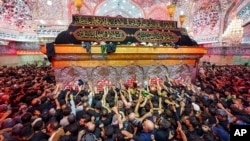More than 21 million Shiite Muslims took part in the Arbaeen pilgrimage in Iraq this year, which reached its peak Sunday with attendees displaying their support for Gaza.
Arbaeen, which means forty in Arabic, marks the 40th day of mourning for the martyrdom of Imam Hussein, the grandson of the Prophet Mohammed and a founding figure in Shiite Islam.
It is one of the world's biggest religious gatherings and a major event for Shiites, who are the majority in Iraq and Iran.
Karbala, where Hussein and his brother Abbas are buried in two enormous mausoleums facing each other, is the center of the Shiite world during this time.
Pilgrims freely express their suffering, weeping and wailing in memory of Hussein, who was killed in 680 A.D. during a battle in Karbala with the Umayyad caliph Yazid.
This year, the events have included prominent displays of Palestinian flags by pilgrims, AFP photographers reported, amid the war in Gaza.
"The total number of Arbaeen pilgrims... reached 21,480,525," the institution that manages the Abbas mausoleum and is responsible for the count, said.
Among them were about 3.5 million Iranian pilgrims, according to official figures reported in Tehran.
Mohammed al-Tamimi, a 32-year-old pilgrim told AFPTV that the Palestinian flags waving among the pilgrims are "in support of our brothers in Palestine and in response to the Zionists, saying that Muslims stand as one against the Zionist actions and against the crimes taking place in Gaza."
The Arbaeen celebrations, which always take place amid tight security, drew around 22 million pilgrims last year, according to official figures. Iran provided the most foreign visitors, with 4 million.
The war in Gaza was sparked by Hamas's October 7 attack on southern Israel, which resulted in the deaths of 1,200 people, most of them civilians, based on Israeli official figures.
Israel's retaliatory military campaign has killed at least 40,405 people in Gaza, according to the Hamas-run territory's health ministry, which does not break down civilian and militant deaths. The U.N. rights office says most of the dead are women and children.




